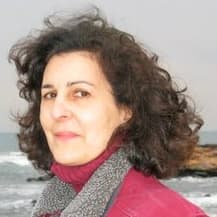Advertisement
Looking For Poetry, Finding Herself: A Portrait Of The Artist As A Young Woman

When Annie slipped the lemon yellow beads over my head, I felt beautiful. The necklace sparkled against my black graduation gown. Even though the beads were only glass and on loan, I treasured them.
Annie (not her real name) was different from my other college friends. She had the powerful legs of a dancer and the determination of her mother, Rose, who led rent strikes in Brooklyn. Annie had answers when everyone else had only questions.
We met senior year, in a boarding house off campus, where we rented rooms to write our theses. We often talked till dawn, fueled by espresso and Yeats’s "Crazy Jane" poems. We read our own poems to each other, and we danced — till the Tiparello-smoking rooming house proprietor tired of our midnight grands jetés and threw us out.
Annie moved in with her folksinger boyfriend, Kevin, who was in danger of being drafted. It was 1969, and the Vietnam War was raging. They planned to buy a farm in Canada where actors, artists, musicians and dancers would live. Annie urged me to join them. When I said no, that I would look for a job in publishing, she asked, “Do you want to get stuck opening mail and going for coffee?”
When I found myself auditioning for a nude dancing gig at businessman’s pub in downtown San Francisco, I knew it was time to go home.
“Great artists are risk-takers. They get out and live, love, celebrate and die. The challenge,” she insisted, “is to find poetry in everyday lives.” Her challenge became my dream.
Rather than calling the New York editor I had interned for the summer prior, I took off for California after graduation. I worked in a Los Angeles soup kitchen, where Sundance, a Lakota Sioux, daydreamed, between alcoholic binges, that Native Americans, poor people and hippies would create a new society. I joined Cesar Chavez and the United Farm Workers on the lettuce boycott, and I sought poetry, as Annie would say, in a tough East Oakland hangout, where I took a job tending bar.
When I found myself auditioning for a nude dancing gig at businessman’s pub in downtown San Francisco, I knew it was time to go home. I wanted to believe again in a dream, but I didn’t even know any more what it was. I wrote Annie, who once had confidence enough for both of us. I packed her borrowed yellow beads in my duffel bag and bought a one-way ticket Back East, stopping in New York to see my father, and then heading to Annie and Kevin’s farm on Cape Breton Island.
Annie had cut her long hair. Her John Lennon glasses were gone, too. She seemed to be squinting at me through contact lenses. During breakfast, I planned to return her necklace. But 3-year-old Patrick was crying. The wood we had gathered was too wet to start the fire. And the pig had broken out of the pen.
I stuffed the necklace into my jeans pocket. For the next few days, I watched over Patrick while Annie and Kevin cut and stacked firewood. Patrick was a handful — every bit as fierce as his mother had been. He insisted on walking around with an ax, until Annie finally noticed and took it away from him.
The artists that I had expected to meet weren’t there. I was the only visitor. Annie’s world had shrunk to the demands of raising a son and holding a farm together. She no longer spoke about an expatriate Yaddo.
Most days, she and Kevin worked till dark. I tossed together some greens and brown rice, and, after dinner, we all immediately went to sleep.
One afternoon while freezing vegetables for winter, Annie and I began to talk. As we diced and parboiled sweet peppers and squash, she confided that subsistence farming was much harder than she had imagined. I asked whether she was happy. “Of course,” she snapped. “Pass those zucchini.”
“If you had it to do all over again,” I pressed. But Annie said that she was no longer interested in abstract ideas. She didn’t have time for the philosophic inquiries that occupied her city friends.
I stopped asking questions. We talked about the slugs that were devouring her broccoli crop. She told me about Patrick’s allergies. We tried to fix a leak in the kitchen. After dinner, I went up to my room to read. The warm yellow necklace now lay forgotten at the bottom of my duffel bag.
Long gone is the dream we once shared. But in our own ways, Annie, now a teacher, and I, a writer, find poetry in everyday lives.
In mid-October, after Annie and I cut the last cauliflower, I decided to tackle the help-wanteds in New York. I wrote to my father that I was coming home.
The night before I left, I pulled the necklace out of my bag. As I reached over to hand it to Annie, it slipped from my hand. The threads holding it together parted, scattering the beads under our feet.
Annie said nothing but opened her dog-eared copy of Yeats and read:
Come let me sing into your ear;
Those dancing days are gone
Defiantly, I kicked off my boots and began to dance. When I turned, Annie joined me. The beads sparkled under our feet like yellow stars in the firelight.
Years have passed since that evening on Cape Breton. Annie did not remain a subsistence farmer. Nor did I stay in New York. Long gone is the dream we once shared. But in our own ways, she, now a teacher, and I, a writer, find poetry in everyday lives.
